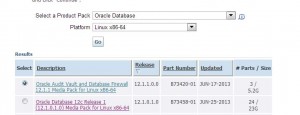Oracle October 2015 CPU – quick and dirty install on 11.2.0.4 and 12.1.0.2 4
[Update 17.11.2015 – Thanks Lars Johan Ulveseth for the extra testing and comment – see below. In fact I’ve only tested the PSU installation on a non-CDB 12c database. There is a missing step, added now, when you are in a multitenant configuration with pluggable databases. Script updated based on Lars comments.]
Following my January post, here are basic instructions to install the latest Oracle security patch. While one should always read the documentation, below you can find how to install CPU Oct 2015 on single instance. Please count about 5 minutes downtime on your database (a bit more if it is the first time you are doing this).
If you are single instance database (no RAC) and either 11.2.0.4 or 12.1.0.2 here are the quick summary of the installation. Tested on Linux and AIX:
Oracle 12.1.0.2 – October 2015 CPU installation
OPatch: You need to update the OPatch tool, minimum version is 12.1.0.1.7. Direct download from Oracle support.
Bundle 12.1.0.2 – Patch 21520444 – Combo OJVM PSU 12.1.0.2.5 and Database PSU 12.1.0.2.5 for UNIX
- Patch 21359755 – Database Patch Set Update 12.1.0.2.5 (Oct2015) –> RAC-Rolling Installable
- Patch 21555660 – Oracle JavaVM Component 12.1.0.2.5 Database PSU (OCT2015) –> Non RAC-Rolling Installable
export PATCH_LOC="/tmp"
1. Download + Upgrade OPatch (Opatch download direct link)
unzip ${PATCH_LOC}/p6880880_121010_Linux-x86-64.zip -d $ORACLE_HOME
2. Stop database+listeners+agent
3. Apply DB PSU (21359755 ) but do NOT run DB PSU post install steps
cd ${PATCH_LOC}
unzip p2*
cd 2*
cd 21359755/
$ORACLE_HOME/OPatch/opatch apply
3. Apply OJVM PSU patch
cd ../21555660/ $ORACLE_HOME/OPatch/opatch apply
4. Restart database [and open pluggable databases] in upgrade mode
SQL> startup upgrade; SQL> alter pluggable database all open upgrade;
5. Run post install steps
cd $ORACLE_HOME/OPatch ./datapatch -verbose
6. Restart database [and open pluggable databases] in normal mode
SQL> shutdown; SQL> startup; SQL> alter pluggable database all open;
Oracle 11.2.0.4 – October 2015 CPU installation
Bundle 11.2.0.4 – Patch 21744335 – Combo OJVM PSU 11.2.0.4.5 and Database SPU 11.2.0.4 (CPUOct2015)
- Patch 21352646 – Database Security Patch Update 11.2.0.4.0 (CPUOCT2015) –> RAC-Rolling Installable
- Patch 21555791 – Oracle JavaVM Component 11.2.0.4.5 Database PSU (OCT2015) –> Non RAC-Rolling Installable
export PATCH_LOC="/tmp"
cd ${PATCH_LOC}
unzip p2*.zip
cd 2*
1. Shutdown databases and services
2. Apply DB PSU (21352646) but do NOT run DB PSU post install steps
cd 21352646 $ORACLE_HOME/OPatch/opatch napply -skip_subset -skip_duplicate
3. Apply OJVM PSU patch
cd ../21555791/ $ORACLE_HOME/OPatch/opatch apply
4. Run the OJVM PSU post install steps followed by the DB PSU (or equivalent) post install steps.
cd $ORACLE_HOME/sqlpatch/21555791 sqlplus / as sysdba
SQL> startup upgrade SQL> @postinstall.sql SQL> shutdown immediate SQL> exit;
cd $ORACLE_HOME/rdbms/admin $ sqlplus / as sysdba
SQL> startup SQL> @catbundle.sql cpu apply SQL> @utlrp.sql SQL> exit;

